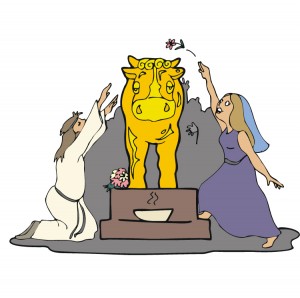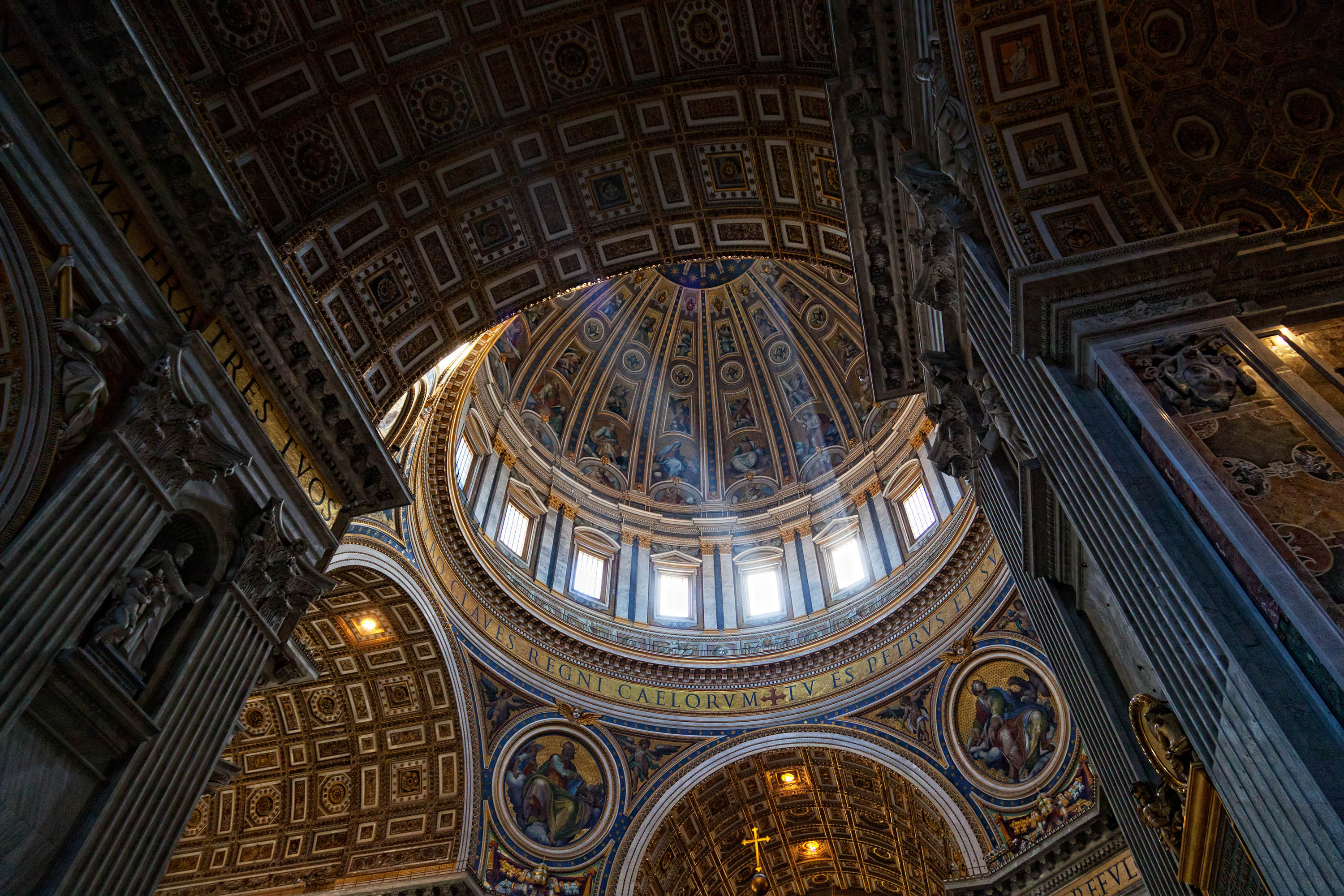Tag Archives: Golden Calf
Golden calf worship is alive and well in the Christian church today!

Exodus 32
Exodus 32:1, Moses delayed coming. Moses is a prophetic picture of Yeshua. Moses’ descending from Mount Sinai is a prophetic picture of Yeshua descending from heaven to the earth the first and second time. When the people presumed that Moses delayed his coming, they fell to the temptation to syncretize with the heathen religious system around them by yielding to their baser nature giving in to the lusts of their flesh as expressed in golden calf worship. Heathen, man-made religious systems have lower moral and spiritual standards than those of YHVH. In many respects, the mainstream church has done the same thing as the ancient Israelites by acting as if Yeshua has delayed his second coming, and by conforming to some of the world’s standards and customs. This is a form of golden calf worship, which is a mixture of Torah-truth and pagan practices. Yeshua warned his disciples against this proclivity of humans to grow impatient and spiritually cold wile waiting for his return (Matt 24:48).
Exodus 32:2, Break off the golden earrings.The Christian people have generously given the mainstream church much gold and other wealth over the past 1900 years. In the mean time, with that wealth, the church system has constructed many huge religious monuments. These are monuments, in part, to the gods of materialism, and is a form of golden calf worship. Neither Yeshua nor his disciples needed vast sums of money, resources or monuments to spread the gospel message. What they lacked in material resources they made up with passion for the gospel message and with the anointing of YHVH to proclaim that gospel with miraculous power. What the mainstream church largely lacks in passion and the anointing to spread the gospel, they now, sadly, substituted with wealth and religious monuments.
The Golden Calf Incident: A Prophetic Picture of the Church
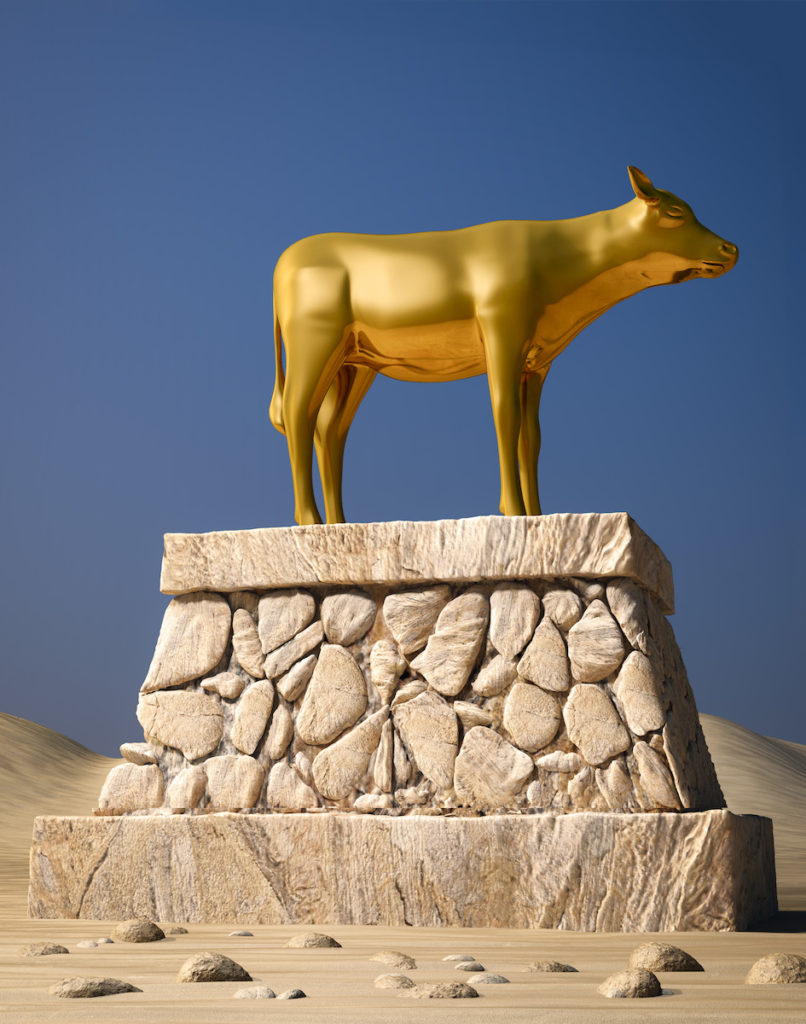
On Shavuot (the Feast of Weeks or Pentecost), at Mount Sinai, YHVH entered into a marriage covenant with the children of Israel, but they were not ready to live up to the terms of that covenant. Those terms, simply stated, involved the Israelites being faithful and obedient only to YHVH, Israel’s Elohim (God) and spiritual husband, and to follow his instruction in righteousness, the Torah. This Israel quickly demonstrated they were not willing to do, and the subsequent golden calf incident is proof of this.
The proverbial ink was barely dry on the marriage certificate between YHVH and the children of Israel, or otherwise state, the children of Israel had hardly said “I do” to their marriage vows (Exod 24:3, 7) when they turned their hearts away from YHVH and began worshipping the golden calf—a pagan deity from Egypt. After the golden calf incident and up until Yom Teruah (the Day of Trumpets or Shofar Blasts) when Moses received the second tablets of stone from YHVH containing the Ten Commandments, the children of Israel, the bride of YHVH, prepared herself not only to receive YHVH’s instructions again, but this time to be faithful to her marriage vows. This Israel did. She remained faithful to YHVH for approximately 38 years while trekking through the wilderness of Sinai, after which she entered the Promised Land and “stayed the course” until after the death of Joshua. What can we as Bible believers learn from ancient Israel that applies to us today?
Sadly, the cycles of history often repeat themselves. This time, it involved the descendants of the spiritual children of Israel who were at Mount Sinai. In the early first century a.d., the redeemed Israelite followers of Yeshua received the Torah written on the fleshly tablets of their hearts by the finger of the Spirit of Elohim on the Day of Pentecost (Shavuot) as recorded in Acts 2. But starting in about a.d. 70 with the destruction of the temple in Jerusalem and continuing up through the Second Jewish Revolt of a.d. 135 until the time of Emperor Constantine (in the fourth century), the first-century spiritual bride of Messiah had, to a large extent, abandoned YHVH’s Torah-commandments and turned, to one degree or another, to a mixed form of worship (of which ancient Israel’s worship at the golden calif was a prophetic foreshadow) where some pagan practices were assimilated into the early churches’ belief system (most notably, Sunday replaced the Sabbath, and Christmas, Easter and other paganistic holidays replaced the biblical feasts).
Moses’ descent of Mount Sinai on Yom Teruah with the second set of tablets containing the Torah prophetically foreshadows Yeshua’s second coming. As Moses renewed YHVH’s covenant with the repentant Israelites after the golden calf incident and the Israelites remained faithful for a long time afterwards, even so, Yeshua, at his second coming, will establish a renewed covenant with his faithful end time saints who have come out of golden calf-type religious systems.
In our day, YHVH is calling out a remnant of people from the church who are leaving behind the pagan traditions of golden calf worship and who are returning to the ancient blessed paths of YHVH’s Torah-instructions in righteousness. The book of Revelation speaks of a group of end-time saints who will say “I do” to YHVH (Rev 14:4), and whose identifying mark is their faith in Yeshua the Messiah (i.e. the gospel message) and yet who faithfully keep YHVH’s Torah-commandments (Rev 12:17 and 14:12).
When Yeshua returns on or near Yom Teruah at the end of this age, he will be ready to marry a bride that is without spot and wrinkle and who has come out of the end-times Babylonian religious whore system (Rev 18:4). This bride who will be wearing the robes of righteousness of Torah-obedience (Rev 12:17; 14:12; 19:7–9) will be ready to enter into a new covenantal agreement—a wedding contract or ketubah—with Yeshua (Heb 8:7–13), the Bridegroom, ever to remain faithful to him and never again to return to Baal or golden calf worship. He will lead his wife into the Messianic Age or Millennium, even as Joshua, a prophetic foreshadow of Yeshua, led the younger generation of wilderness Israelites into the Promised Land.
Golden Calf Worship Among YHVH’s People Today
Let’s look at the series of events that occurred as the children of Israel were leaving Egypt, which have major relevance to what is occurring in mainstream Christianity in our day. If we fail to learn the lessons of history, we’ll likely repeat the mistakes of history. It has to do with golden calf worship.
Continue readingHistory Repeats Itself Again and Again—The Golden Calf, the Church and YOU
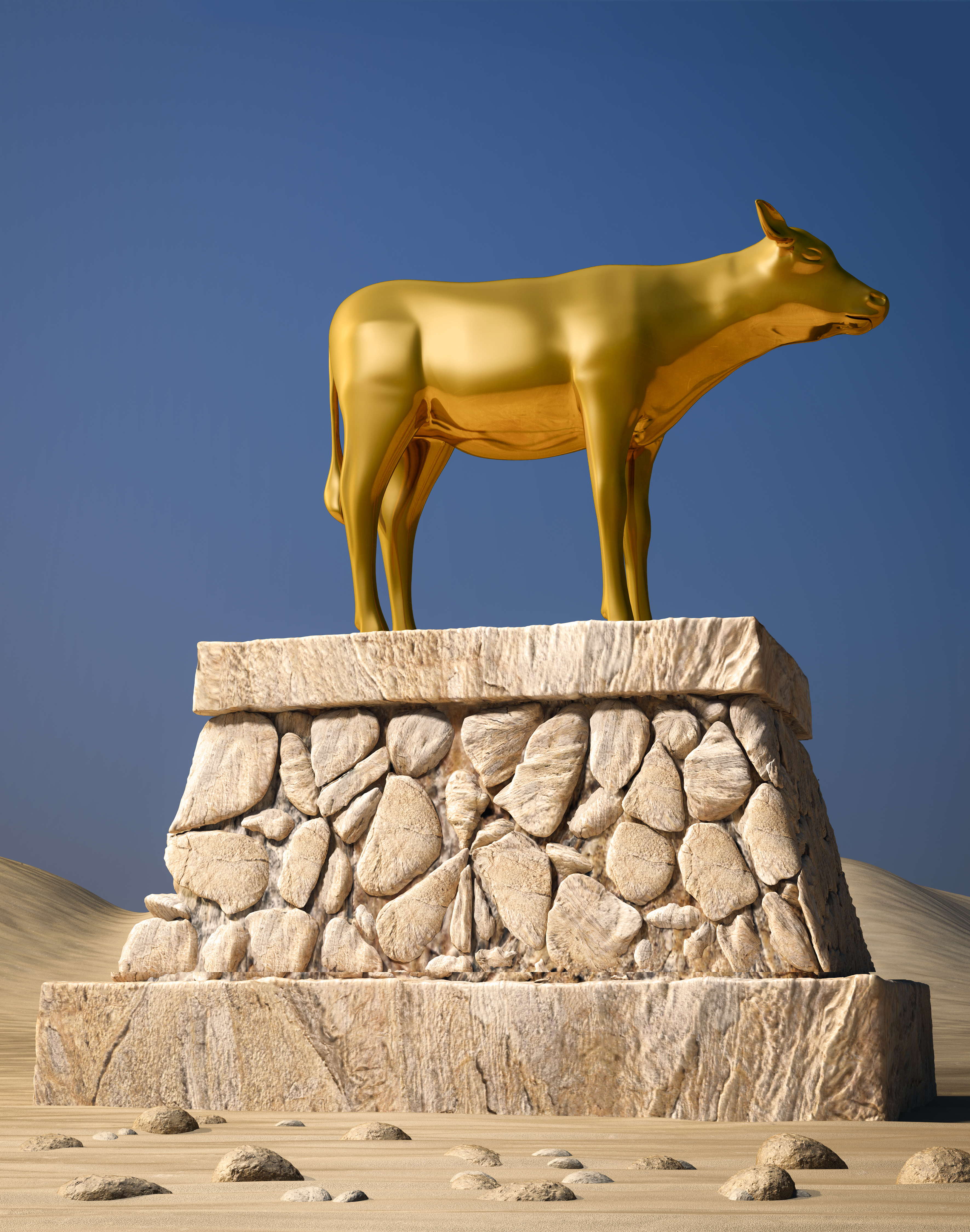 Exodus 32:1, Moses delayed coming. Moses is a prophetic picture of Yeshua. Moses’ descending from Mount Sinai is a prophetic picture of Yeshua descending from heaven to the earth the first and second time. When the people presumed that Moses delayed his coming, they fell to the temptation to syncretize with the heathen religious system around them by yielding to their baser nature giving in to the lusts of their flesh as expressed in golden calf worship. Heathen, man-made religious systems have lower moral and spiritual standards than those of YHVH. In many respects, the mainstream church has done the same thing as the ancient Israelites by acting as if Yeshua has delayed his second coming, and by conforming to some of the world’s standards and customs. This is a form of golden calf worship, which is a mixture of Torah-truth and pagan practices. Yeshua warned his disciples against this proclivity of humans to grow impatient and spiritually cold wile waiting for his return (Matt 24:48).
Exodus 32:1, Moses delayed coming. Moses is a prophetic picture of Yeshua. Moses’ descending from Mount Sinai is a prophetic picture of Yeshua descending from heaven to the earth the first and second time. When the people presumed that Moses delayed his coming, they fell to the temptation to syncretize with the heathen religious system around them by yielding to their baser nature giving in to the lusts of their flesh as expressed in golden calf worship. Heathen, man-made religious systems have lower moral and spiritual standards than those of YHVH. In many respects, the mainstream church has done the same thing as the ancient Israelites by acting as if Yeshua has delayed his second coming, and by conforming to some of the world’s standards and customs. This is a form of golden calf worship, which is a mixture of Torah-truth and pagan practices. Yeshua warned his disciples against this proclivity of humans to grow impatient and spiritually cold wile waiting for his return (Matt 24:48).
Exodus 32:2, Break off the golden earrings. The Christian people have generously given the mainstream church much gold and other wealth over the past 1900 years. In the mean time, with that wealth, the church system has constructed many huge religious monuments. These are monuments, in part, to the gods of materialism, and is a form of golden calf worship. Neither Yeshua nor his disciples needed vast sums of money, resources or monuments to spread the gospel message. What they lacked in material resources they made up with passion for the gospel message and with the anointing of YHVH to proclaim that gospel with miraculous power. What the mainstream church largely lacks in passion and the anointing to spread the gospel, they now, sadly, substituted with wealth and religious monuments.
The Golden Calf Incident: A Prophetic Picture of the Church
On Shavuot (the Feast of Weeks or Pentecost), at Mount Sinai, YHVH entered into a marriage covenant with the children of Israel, but they were not ready to live up to the terms of that covenant. Those terms, simply stated, involved the Israelites being faithful and obedient only to YHVH, Israel’s Elohim (God) and spiritual husband, and to follow his instruction in righteousness, the Torah. This Israel quickly demonstrated they were not Continue reading
Golden Calf Worship Among YHVH’s People Today
Are YHVH’s people still prone to golden calf worship today?
Some things never change, since human nature is still the same today as it was thousands of years ago when the children off Israel worshipped the golden calf.
So let’s explore this question.
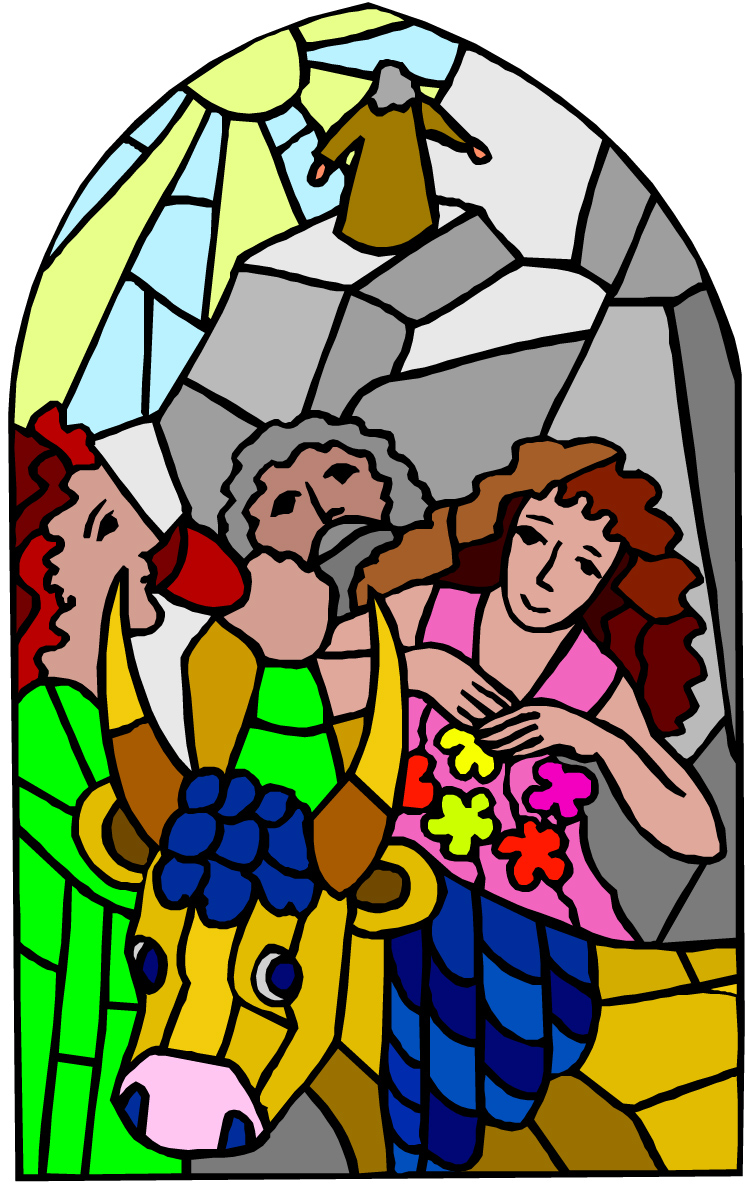
Let’s look at the series of events that occurred as the children of Israel were leaving Egypt, which have major relevance to what is occurring in mainstream Christianity in our day. If we fail to learn the lessons of history, we’ll likely repeat the mistakes of history. It has to do with golden calf worship.
YHVH redeemed the children of Israel out of Egypt and set the slaves free. He blessed them not only by giving them their freedom, but by giving them the wealth (gold and silver) of Egypt as well. We read that the Israelites exited of Egypt with a high hand. They were victorious, free and wealthy.
YHVH led them into the wilderness en route to the Promised Land—normally an eleven day journey. They had some difficulties: Pharaoh tried to kill them at the Red Sea, they lacked clean drinking water, and they had food issues, but YHVH provided them deliverance from Pharaoh, gave them clean water, manna and meat, and they overcame these trials.
Next, YHVH led the Israelites to the foot of Mount Sinai, and on Shavuot he made a covenantal agreement with them and gave them his Torah as their national constitution. They agreed to obey him and to keep his commandments. He promised to bless them if they remained faithful to him.
Moses went up to Mount Sinai to receive the Torah-covenant on two tablets of stone. While he was gone for 40 days, the people grew worried and anxious and become weary of waiting for Moses to return. This was a test they had to pass of their faithfulness. Would they be faithful to YHVH and keep his commandments, or would they stray spiritually from the path of righteousness YHVH had given them and they had agreed to follow?
The Israelites got tired of waiting, and took the gold from Egypt and turned it into a golden calf, and then they rose up to play (to party). They even called their revelry a feast to YHVH! They used religious verbiage like “YHVH” and “feast” to add legitimacy to their Continue reading
Golden Calf Worship Among YHVH’s People Today
Let’s look at the series of events that occurred as the children of Israel were leaving Egypt, which have major relevance to what is occurring in mainstream Christianity in our day. If we fail to learn the lessons of history, we’ll likely repeat the mistakes of history. It has to do with golden calf worship.
YHVH redeemed the children of Israel out of Egypt and set the slaves free. He blessed them not only by giving them their freedom, but by giving them the wealth (gold and silver) of Egypt as well. We read that the Israelites exited of Egypt with a high hand. They were victorious, free and wealthy.
YHVH led them into the wilderness en route to the Promised Land—normally an eleven day journey. They had some difficulties: Pharaoh tried to kill them at the Red Sea, they lacked clean drinking water, and they had food issues, but YHVH provided them deliverance from Pharaoh, gave them clean water, manna and meat, and they overcame these trials.
Next, YHVH led the Israelites to the foot of Mount Sinai, and on Shavuot he made a covenantal agreement with them and gave them his Torah as their national constitution. They agreed to obey him and to keep his commandments. He promised to bless them if they remained faithful to him.
Moses went up to Mount Sinai to receive the Torah-covenant on two tablets of stone. While he was gone for 40 days, the people grew worried and anxious and become weary of waiting for Moses to return. This was a test they had to pass of their faithfulness. Would they be faithful to YHVH and keep his commandments, or would they stray spiritually from the path of righteousness YHVH had given them and they had agreed to follow?
The Israelites got tired of waiting, and took the gold from Egypt and turned it into a golden calf, and then they rose up to play (to party). They even called their revelry a feast to YHVH! They used religious verbiage like “YHVH” and “feast” to add legitimacy to their illegitimate activities, but this didn’t change the sin of their behavior. Sin is still sin regardless of how we attempt to cloak it in spiritual terms and costumes in an attempt to justify our wicked behavior.
Moses then came down from Sinai with the stone tablets, saw the people worshipping the golden calf and the people playing, and he brought judgment against those who were unfaithful to YHVH and rewarded those who had been faithful to him.
Let’s now analyze this story to see what spiritual lessons we can glean from it.
YHVH blessed the children of Israel by setting them free from Egypt, giving them honor as freedmen, taking them to himself to be his own special people, giving them a religion, a legal code and much material wealth. What was the first job assignment YHVH gave his people to do? It was to build a tabernacle so that YHVH might dwell in their midst.
YHVH gave the Israelites wealth from Egypt not only as a remuneration for their years of slavery in that nation (Torah teaches that a workman is worthy of his hire), but he gave them wealth so they could build him a home. Instead, what was the first thing the Israelites did with their wealth? They built a golden calf in honor of their past life in Egypt.
The golden calf represented the spiritual idols or strongholds of sin that were already in their hearts, and which they failed to leave behind in Egypt. Though the Israelites had physically come out of the idolatry of Egypt, they hadn’t gotten Egypt’s idols out of their own hearts. When the way of the wilderness became too tough and their faith was tested (i.e. would they remain faithful to YHVH in the time Continue reading
Golden Calf Worship Among YHVH’s People Today
Let’s look at the series of events that occurred as the children of Israel were leaving Egypt, which have major relevance to what is occurring in mainstream Christianity in our day. If we fail to learn the lessons of history, we’ll likely repeat the mistakes of history. It has to do with golden calf worship.
YHVH redeemed the children of Israel out of Egypt and set the slaves free. He blessed them not only by giving them their freedom, but by giving them the wealth (gold and silver) of Egypt as well. We read that the Israelites exited of Egypt with a high hand. They were victorious, free and wealthy.
YHVH led them into the wilderness en route to the Promised Land — normally an eleven day journey. They had some difficulties: Pharaoh tried to kill them at the Red Sea, they lacked clean drinking water, and they had food issues, but YHVH provided them deliverance from Pharaoh, gave them clean water, manna and meat, and they overcame these trials.
Next, YHVH led the Israelites to the foot of Mount Sinai, and on Shavuot he made a covenantal agreement with them and gave them his Torah as their national constitution. They agreed to obey him and to keep his commandments. He promised to bless them if they remained faithful to him.
Moses went up to Mount Sinai to receive the Torah-covenant on two tablets of stone. While he was gone for 40 days, the people grew worried and anxious and become weary Continue reading
Two Choices: Money and Power or the Anointing of Elohim
Exodus 32:2, Break off the golden earrings.The Christian people have generously given the mainstream church much gold and other wealth over the past 1900 years. In the mean time, with that wealth, the church system has constructed many huge religious monuments. These are monuments the gods of materialism—to golden calf worship. Neither Yeshua nor his disciples needed vast sums of money, resources or monuments to spread the gospel message. What they lacked in material resources they made up with passion for the gospel message and with the anointing of YHVH to proclaim that gospel with miraculous power. What the mainstream church largely lacks in passion and the anointing to spread the gospel, they now, sadly, compensate for via wealth and religious monuments.
Given the choice, some of us have chosen the anointing and favor of Elohim over money and power and the approval of men.



